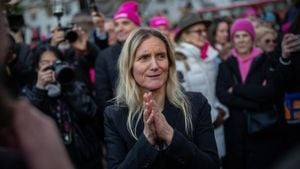A flurry of international responses has emerged amid the continuing Russian military actions, highlighting tensions and divergent approaches among nations. Recently, the UK government imposed sanctions on three Russian paramilitary groups, marking the largest punitive measure since May 2023. Foreign Office officials stated the sanctions targeted the actions of the Africa Corps, Bear Brigade, and Private Military Company Española, all known for their involvement in human rights abuses across Africa, particularly in Libya, Mali, and the Central African Republic.
These measures were announced on November 6, as the UK Foreign Secretary David Lammy emphasized the need to address the destabilizing influence of these groups. The use of private military contractors has become synonymous with Russia's military strategy, extending its reach beyond its borders, particularly throughout the African continent. Allegations of widespread human rights violations and the exploitation of local resources have accompanied their operations.
Despite the sanctions, skepticism remains about their efficacy. Many observers argue the sanctions might only serve as fodder for conspiracy theories among some African populations, who might view them as Western attempts to undermine Russian influence. Notably, groups like the Africa Corps have stepped up their activities following the disbandment of the infamous Wagner Group earlier, continuing to exert control over lucrative resources like gold mines.
Meanwhile, the situation within Russia itself remains complex. President Vladimir Putin has articulated firm terms for any potential peace negotiations with Ukraine, demanding Ukraine's complete withdrawal from the territories Russia claims, including Donetsk, Luhansk, Kherson, and Zaporizhzhia. He views this conflict through the lens of national security and identity, framing it as pivotal to Russia's global position.
Putin's rigid stance is coupled with domestic pressures, as Russia contends with challenges such as inflation and declining living standards due to external sanctions. Protests following grim economic realities hint at fissures within the formerly steadfast support for the conflict.
Across international lines, Ukraine's leadership has consistently reinforced its unwavering pursuit of sovereignty, with President Volodymyr Zelensky pushing for the unequivocal withdrawal of all Russian combatants from Ukrainian territory, including Crimea. Zelensky's administration adamantly rejects any negotiations perceived to compromise national integrity, emphasizing accountability and adherence to international law.
Efforts toward a diplomatic resolution have seemed increasingly futile, particularly with notable events such as China's 12-point peace proposal, which has been dismissed for its leniency toward Russian demands. A structured peace process appeared ideal, with propositions for the establishment of neutral zones and phased troop withdrawals, yet entrenched positions hinder any meaningful dialogue.
The global community's engagement, particularly through multi-national organizations like the United Nations, has failed to result in any significant breakthroughs, with the prospects for peace diminished amid the chaos. While some parties advocate for comprehensive discussions involving key geopolitical concerns, disparities over NATO's future involvement with Ukraine and Russia's territorial claims remain contentious and unresolved.
With winter approaching, the humanitarian crisis deepens, exacerbated by the sustained military engagements—refugees flood neighboring countries, and civilian casualties proliferate, amplifying the urgency for the international response which often proves inadequate. Such realities underline the necessity for genuine diplomatic negotiations rather than mere rhetoric.
On the African continent, Russia's influence continues to grow, with key figures from various nations seeming to align themselves with Kremlin ambitions. While many countries publicly decry Western interventions and sanctions, behind the scenes, the stakes are high, balancing strategic partnerships against the overarching need for peace and stability.
Overall, the United Kingdom's sanctions represent just one piece of the puzzle within the broader geopolitical game at play, where ambitions and historical grievances complicate the path to peace. Following the UK government's actions, the international community remains at a crossroads, trying to define its identity, values, and objectives against the backdrop of one of the most significant military conflicts of the 21st century. The coming months will reveal whether these sanctions and diplomatic overtures can yield meaningful results or if the conflict will continue to escalate without resolution.



